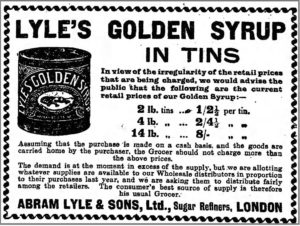Thursday Dec 13th, 1917
Reveille 6:00. Still in harbour. Boat drill 9:45. Route march 12:30. Bought bread and apples.
Food Shortages
Frank wasn’t alone in being hungry, but at least he managed to do something about it. Much of Europe was now facing food shortages. The Allies had been blockading Germany and the Central Powers since August 1914 and the U-boats were reeking havoc with the international supply of food to Britain and its Allies.
At the outbreak of war, two-thirds of the calorific intake for the average Briton were imported. Moreover the sources of many staples were the empires of the enemy. This meant that Britain had to seek out new and often more distant supplies, making them even more vulnerable to enemy attack.¹
Nationally, as early as 1914, maximum prices for key commodities had been set, hoarding had been discouraged and gardens dug over for vegetables (even in Buckingham Palace).º Food Committees had been set up across the country.
Rationing
Now, over three years into the war, there is growing concern in Britain about food shortages and rising prices. The initial strategy had been to control food distribution to wholesalers and retailers in order to ensure that all areas of the country were treated fairly. However, this was increasingly recognized as flawed, as people who could spend time roaming from shop to shop to gather food had an advantage over those who were working. Yet the country needed everyone who could, to work.
On December 11th, 1917, the Manchester Food Committee declared itself in favour of general rationing – initially for sugar and meat. Within days this had been expanded to butter and margarine. Along with rationing came price control with even manufacturers getting in on the act. For example, on the same date, Lyle’s took an advertisement out in the Manchester Guardian specifying the maximum price that a retailer should be charging for their Golden Syrup.²
Populations in countries like Britain that managed to introduce a controlled way for food distribution were saved from the worst of the privations. Others suffered dire consequences including Russia, where food shortages were a key trigger point in the Revolution, and the Ottoman Empire which suffered significant civilian fatalities.³
References & further reading
º ‘Food & Rationing‘ in The Illustrated First World War
¹ ‘Sea Transport & Supply‘ in Encyclopaedia 1914-1918 online
² Clipping of advertisement and info on Manchester Food Committee – Manchester Guardian, December 11th, 1917, Copyright © 2017 Newspapers.com.
³ ‘Rationing & Food Shortages during WWI‘ from The Imperial War Museums




This man is my Great Great Grandfather
My grandmother is Vivienne B
Isobella, Nice to hear from you. Your Grandmother has been a great help with the blog!